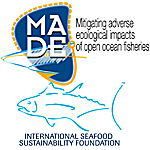For the pelagic longline fisheries (PLF) knowledge of both behaviour and distribution of fish for target species (mainly tunas and swordfish) are not sufficient to mitigate: i) non-sustainable fisheries interactions with endangered, protected and threatened marine top predators and ii) the impact of the fishing pressure on non-managed bycatch species. Furthermore, PLF have another indirect impact on marine ecosystems: removal of marine resources used as bait. Many bait species might serve as important source of natural protein for direct human consumption while in the meantime, most of bait used in the tuna industry as well as non processed dead discards and post processing fish remains are source of organic wastes in the oceanic ecosystems. In the context of the ecosystem approach to fisheries the substitution of natural bait with artificial analogue is apparently a major issue to be addressed by gear technologists. Development of artificial bait is one of the major challenges for PLF in the nearest future. Such an innovation might alternate extremely negative perception of longline gear by: i) decrease of volume of capture fisheries yields directed to bait, ii) decrease of discards by transformation of wastes produced by tuna fishing industry into by-products, iii) improves the selectivity and performance of the longline gear both in the size of targeted fish and species caught.
Targeting objective to develop artificial bait for PLF we present the bait prototype developed in the MADE project and preliminary results obtained from fishing trials, which are still ongoing.
- Presentation

 PDF version
PDF version
